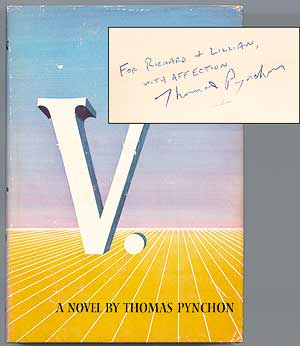
Glossary
What book dealers really mean. Click on thumbnails for larger images.
Inscribed
A personalized sentiment or message in a book, usually from the author to another specific person. We distinguish this from a simple, unpersonalized signature, which we would refer to as "signed," rather than inscribed. We also distinguish an inscribed book from one that is signed by the author with a sentiment but is not clearly addressed to a specific individual (such as "Best wishes, J.D. Salinger" - who would want that?). Some authors will plow through a stack of their books at a bookstore, writing in each one a generic sentiment for the bookstore to sell afterwards. In very recent years some unscrupulous individuals have claimed that signed books are preferable to inscribed books because usually the inscribed book is inscribed "to some stranger." What they aren't telling you is that it is easier to forge a signature than it is to forge an entire inscription. If you would prefer a book allegedly signed by Thomas Pynchon to this copy of his first book genuinely inscribed by him to the parents of his friend and classmate, the author Richard Farina, (offered in our second Classic Book Cards set), you're just not getting it. For perhaps the best explanation of the entire signed versus inscribed argument, refer to the excellent article by Ken Lopez. In short, the more that has been hand-written by the author into a copy of his book, the better.
Issue
Gesundheit. Something that (along with "states") will give you a headache. Technically a change in the first edition that has been determined to have occurred after the date of publication. Thus a "first edition, second issue" would constitute a book from the original edition, which has incorporated a correction or change to the text, and which some tireless (or tiresome) scholar thinks he can prove happened after the date of publication. These have to be paid attention to, but these determinations can be fluid as scholarship on a specific title evolves. Issue and state are often confused or used incorrectly, but never by us - er, well, hardly ever.
Issue points
Noted changes between various copies of the same book. Collectors prefer the earliest issue of a first printing, but since issue points are usually not observed until much later, figuring out which issue points have priority requires careful scholarship, attention to the most minute details, and the ability to BS when in doubt.

